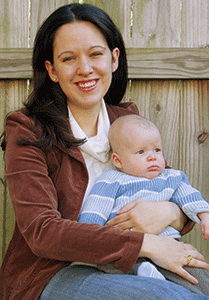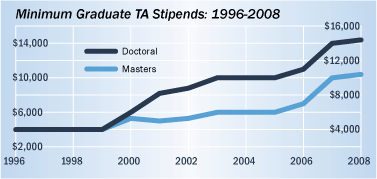When Life Won't Wait
New benefits assist students

“The parental leave program has made it possible for me to have a real family leave without the academic and financial burden that is already so much a part of a graduate student’s life,” says Letia Frandina, pictured with her son, Madeus Mahoney Frandina.
For most graduate students attending Carolina, their studies and research must always take priority, often forcing other parts of their lives to be put on hold. But sometimes, life will not wait.
That was the case for Letia Frandina, a third-year doctoral student focused on rhetorical studies in the Department of Communication Studies. She gave birth to Madeus Mahoney Frandina on Nov. 9, 2007.
Frandina was relieved to learn of a program in place to assist graduate student mothers and fathers who need time to care for their newborns. The Graduate School’s parental leave program provides six weeks of leave with stipend, health insurance and extra time to make up course work.
“This was a huge sigh of relief for me and enabled me to continue on an efficient track with school and still make time to have a family,” Frandina says. “My colleague had to take a leave before the program was enacted and it was a huge financial and academic strain on her.”
Parental leave is just one of numerous programs the Graduate School has enacted over the past decade in order to meet the needs of graduate students’ personal lives. The first benefit that Dean Linda Dykstra worked to implement during her leadership of the Graduate School was health insurance for all teaching and research assistants (TAs and RAs).
Programs like parental leave and health insurance are important for graduate students’ physical well-being, but surviving financially is another issue they must face on a regular basis. Many graduate students take a significant pay cut from working a full-time job when they become full-time students again.
“In terms of student life, the topic that is perhaps most frequently on students’ minds is their financial situation. So it was very important for us to increase our stipends,” Dykstra says. “We set out a path in a very determined way to increase those funds over a period of four years. We’re still not quite where we want to be, but we’re getting closer and closer with each increase.”

The Graduate School went about persuading individual departments to increase stipends by requiring a minimum stipend level be provided students in order to access tuition funds. Tuition support comes from a pool of money from the state of North Carolina that the Graduate School administers. Dykstra says that connecting this tuition support to a minimum stipend level enabled her to influence a positive change.
In the end, though, the Graduate School’s effort on behalf of students is about more than just increasing their funds. The goal is to provide an opportunity for students to thrive academically as well as personally. Graduate students clearly appreciate this support.
“The parental leave program has made it possible for me to have a real family leave without the academic and financial burden that is already so much a part of a graduate student’s life,” Frandina says. • Joshua D. Meyer


